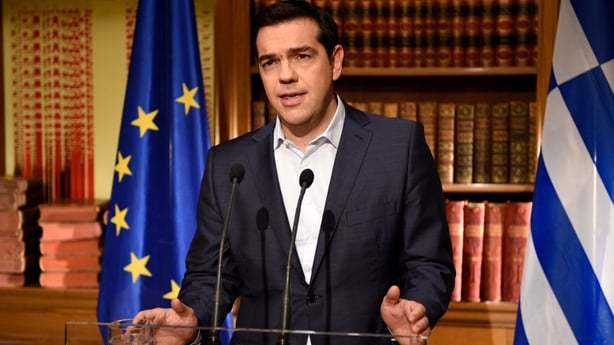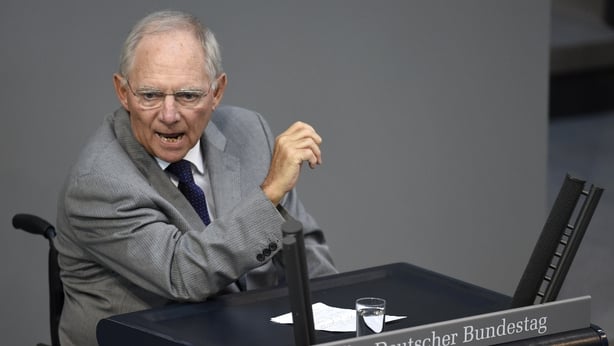The Eurogroup of eurozone finance ministers has agreed that there can be no further discussion of credit for Greece until after Sunday's referendum.
The chairman of the group, Jeroen Dijsselbloem, made the comments after a conference call.
The International Monetary Fund, meanwhile, has said that allowing a borrower to delay repayment, as Greece has requested, is generally ineffective in helping a country overcome crisis.
"The IMF does not extend payment terms as a matter of longstanding policy," the global crisis lender said in a statement.
"More than 30 years ago, the IMF granted a few low-income countries delays at their request, but in each case the delay proved not to help with immediate financing needs or fundamental economic problems."
Greece asked for an extension on its €1.5bn IMF debt payment yesterday, just hours before it was due.
It failed to make the payment, becoming the first advanced economy to default on a loan to the 188-nation institution.
The IMF executive board, which did not rule on the Greek government's request, will review it "in the coming weeks," a person close to the matter said.
A ruling in favour of the request would mean the country would not be officially judged "in arrears" on its loan, the IMF's terminology for default.
Being in arrears makes a country ineligible to draw on IMF financing.
Meanwhile, Greece faces a payment of €455m due to the institution on 13 July, and another €284m on 1 August.
In its statement today, the IMF emphasised that Greece's problems would be best addressed through a "balanced approach", combining Greece's steps to reform its economy and the country's European partners providing additional financing and debt relief.
"The IMF's priority remains helping the Greek people through this difficult period of economic turmoil," it said.
Moody's today cut its credit rating for Greece to a deep-junk Caa3, warning it is now less likely that official creditors will support the country, whatever happens in Sunday's referendum.
"Moody's believes that without ongoing support from official creditors, Greece will default on its privately-held debt," the ratings agency said.
Noting that Greek Prime Minister Alexis Tsipras had suggested amendments to terms for an earlier bailout that expired yesterday, Mr Dijsselbloem said in an online video statement: "At this point in time we simply took note of those proposals.

"The main decision was that given the political situation, the rejection of the previous proposals, the referendum which will take place on Sunday and the No advice of the Greek government we see no ground for further talks at this point.
"There will be no further talks in the coming days, nor at Eurogroup level, nor between the Greek authorities and the institutions on proposals or financial arrangements.
"We will simply wait now the outcome of the referendum on Sunday and take into account the outcome of the referendum.
"I am very sorry about this situation given the strong determination of the Greek people to be a part of Europe and to remain a part of the eurozone, in which we fully support them."
EU president Donald Tusk wrote on Twitter: "Europe wants to help Greece. But cannot help anyone against their own will. Let's wait for the results of the Greek referendum."
Mr Tsipras said his country would still hold a referendum on the terms of its bailout, urging people to vote No in order to win a better deal.

In a televised address to the nation, he said Greece would continue to negotiate with its international creditors, and insisted that Athens wanted to stay in Europe.
"A No vote does not signify a rupture with Europe, but a return to the Europe of values," he said, rebutting accusations from EU leaders that the referendum was essentially a vote for or against staying in the European Union.
Defying the creditors at the referendum would place them under "great pressure to continue" with negotiations, and as such it would be a "decisive step for a better deal."
Greece made a fresh reform offer to its creditors a day after defaulting on the IMF, but it was immediately rebuffed by Germany, who ruled out a deal before the Sunday referendum.
Although preparations are already under way for the vote, its fate was unclear after the Council of Europe rights group said it fell short of European standards.
"It is obvious that the timeline is too short with regards to our standards," said Daniel Holtgen, the spokesman for the Council's secretary general Thorbjoern Jagland.
French President Francois Hollande has expressed his frustration with the slow progress on Greece's debt crisis, saying an agreement was needed "immediately".
"Let's be clear, the agreement must come immediately," said Mr Hollande, arriving in the southern city of Lyon for a climate change conference.
"It's been a while that we've been talking about this agreement - it must happen now."
Earlier, the Greek government confirmed that it has sent the "amended" proposal to its creditors in the hope of sealing a deal to stave off financial ruin.
A letter sent by Mr Tsipras to the EU, ECB and IMF yesterday evening asked for "a new agreement that regulates the country's financing issues through the European Stability Mechanism (ESM), to ensure debt sustainability by focusing on growth," a government source said.
However, German Finance Minister Wolfgang Schaeuble has said the new offer has brought no further clarity, adding there was "no basis" for serious negotiations with Athens at the moment.
"First of all, Greece must be clear about what it wants," said Mr Schaeuble at a news conference to present German budget plans.

Mr Schaeuble said Greece was sending mixed signals in debt talks and called on its government to "clarify its position" before negotiations with creditors can resume.
Mr Schaeuble said it was not clear if it would be possible to sort out a new bailout for Greece before the country is due to repay €3.5bn of bonds to the ECB on 20 July.
"I won't make any predictions about that," he said, adding "we're open to anything."
Analysis: Business Editor David Murphy in Athens

I think the issue is now that there is going to be a lot of focus on the banking system over the coming days because the Greeks have boxed themselves into a corner.
Because they are holding a referendum at the weekend, Angela Merkel is saying there shouldn't be any thought given to a new bailout until after their referendum.
Essentially, they can't get the money they need to reopen their bank system until such time as they have an outcome from their referendum.
The government is advocating a No in the referendum and obviously that's going to make the bailout discussions with Europe more difficult from a European point of view.
Yesterday we had a third attempt by the Greek government to cobble together some sort of bailout – they made the request to Europe’s bailout fund - in a sense, going over the heads of EU finance ministers.
Those ministers are going to have a teleconference this morning to discuss the latest request, but it seems as if they will only give consideration to it next week in a serious way. It doesn't seem as if Greece is going to get any funds.
'High rates of decline' for Greek credit and debit cards
Meanwhile, Ryanair has said that it will allow Greek customers to pay with cash after capital controls caused problems with credit card payments on its website.
The imposition of capital controls on Sunday evening means Greeks are no longer able to purchase goods or services from many big international online suppliers including Google, Apple and Facebook.
The airline, which operates out of 11 airports in Greece, said in a statement it was experiencing "high rates of decline" on Greek credit and debit cards.
"Ryanair has now provided the option for Greeks looking to travel to buy their plane tickets in cash at the Ryanair ticket desk at its airports," the statement said.

